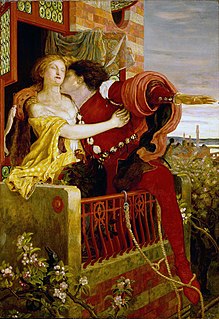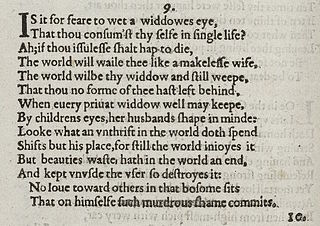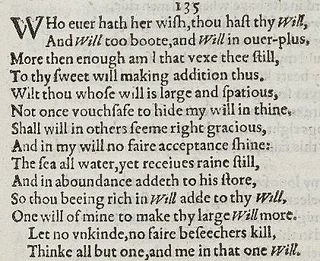Related Research Articles

Macbeth is a tragedy by William Shakespeare; it is thought to have been first performed in 1606. It dramatises the damaging physical and psychological effects of political ambition on those who seek power for its own sake. Of all the plays that Shakespeare wrote during the reign of James I, who was patron of Shakespeare's acting company, Macbeth most clearly reflects the playwright's relationship with his sovereign. It was first published in the Folio of 1623, possibly from a prompt book, and is Shakespeare's shortest tragedy.

Romeo and Juliet is a tragedy written by William Shakespeare early in his career about two young Italian star-crossed lovers whose deaths ultimately reconcile their feuding families. It was among Shakespeare's most popular plays during his lifetime and, along with Hamlet, is one of his most frequently performed plays. Today, the title characters are regarded as archetypal young lovers.
John Dover Wilson CH was a professor and scholar of Renaissance drama, focusing particularly on the work of William Shakespeare. Born at Mortlake, he attended Lancing College, Sussex, Gonville and Caius College, Cambridge and taught at King's College London before becoming Regius Professor of English literature at the University of Edinburgh.

Sonnet 2 is one of 154 sonnets written by the English playwright and poet William Shakespeare. It is a procreation sonnet within the Fair Youth sequence.

Sonnet 3 is one of 154 sonnets written by the English playwright and poet William Shakespeare. It is often referred to as a procreation sonnet that falls within the Fair Youth sequence.

"Sonnet 18" is one of the best-known of the 154 sonnets written by the English playwright and poet William Shakespeare.

Sonnet 9 is one of 154 sonnets written by the English playwright and poet William Shakespeare. It is a procreation sonnet within the Fair Youth sequence.

Sonnet 10 is one of 154 sonnets written by the English playwright and poet William Shakespeare. It is a procreation sonnet within the Fair Youth sequence.

Sonnet 15 is one of 154 sonnets written by the English playwright and poet William Shakespeare. It forms a diptych with Sonnet 16, as Sonnet 16 starts with "But...", and is thus fully part of the procreation sonnets, even though it does not contain an encouragement to procreate. The sonnet is within the Fair Youth sequence.

Sonnet 27 is one of 154 sonnets published by William Shakespeare in a quarto titled Shakespeare's Sonnets in 1609. It is a part of the Fair Youth group of sonnets, and the first in a group of five sonnets that portray the poet in solitude and meditating from a distance on the young man. A theme of the first two of the group regards the night and restlessness, which is a motif also found in the sonnets of Petrarch.

A bad quarto, in Shakespearean scholarship, is a quarto-sized printed edition of one of Shakespeare's plays that is considered to be unauthorised, and is theorised to have been pirated from a theatrical performance without permission by someone in the audience writing it down as it was spoken or, alternatively, written down later from memory by an actor or group of actors in the cast – the latter process has been termed "memorial reconstruction". Since the quarto derives from a performance, hence lacks a direct link to the author's original manuscript, the text would be expected to be "bad", i.e. to contain corruptions, abridgements and paraphrasings.

Sonnet 67 is one of 154 sonnets written by the English playwright and poet William Shakespeare. It's a member of the Fair Youth sequence, in which the poet expresses his love towards a young man, and is a thematic continuation of Sonnet 66. In this poem, the speaker's anxiety about the social difference between him and his beloved takes the form of a criticism of courtly corruption. This sonnet was placed first in the pirated and mangled edition of 1640.

Sonnet 98 is one of 154 sonnets written by the English playwright and poet William Shakespeare. It's a member of the Fair Youth sequence, in which the persona expresses his love towards a young man. It is the second of a group of three sonnets to treat a separation of the speaker from his beloved.

In Shakespeare's Sonnet 135, the speaker appeals to his mistress after having been rejected by her.

Sonnet 84 is one of 154 sonnets published by the English playwright and poet William Shakespeare in 1609. It's part of the Fair Youth sequence, and the seventh sonnet of the Rival Poet group.

Sonnet 96 is one of 154 sonnets written by the English playwright and poet William Shakespeare. It is a member of the Fair Youth sequence.

Sonnet 104 is one of 154 sonnets written by the English playwright and poet William Shakespeare. It is a member of the Fair Youth sequence, in which the poet expresses his love towards a young man.

The Oxford Shakespeare is the range of editions of William Shakespeare's works produced by Oxford University Press. The Oxford Shakespeare is produced under the general editorship of Stanley Wells and Gary Taylor.

The Tempest is a play by English playwright William Shakespeare, probably written in 1610–1611, and thought to be one of the last plays that Shakespeare wrote alone. After the first scene, which takes place on a ship at sea during a tempest, the rest of the story is set on a remote island, where the sorcerer Prospero, a complex and contradictory character, lives with his daughter Miranda, and his two servants—Caliban, a savage monster figure, and Ariel, an airy spirit. The play contains music and songs that evoke the spirit of enchantment on the island. It explores many themes, including magic, betrayal, revenge, and family. In Act IV, a wedding masque serves as a play-within-the play, and contributes spectacle, allegory, and elevated language.

Shylock is a fictional character in William Shakespeare's play The Merchant of Venice. A Venetian Jewish moneylender, Shylock is the play's principal antagonist. His defeat and conversion to Christianity form the climax of the story.
References
- ↑ Kermode, Frank (11 January 2004). "Avon Calling". The New York Times. Retrieved 3 January 2010.
- ↑ "Faculty Profile". Stanford University. Retrieved 3 January 2010.
- ↑